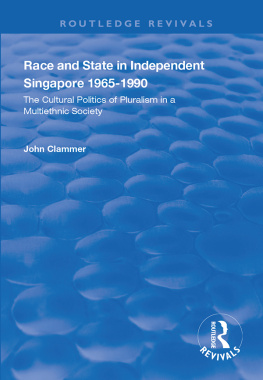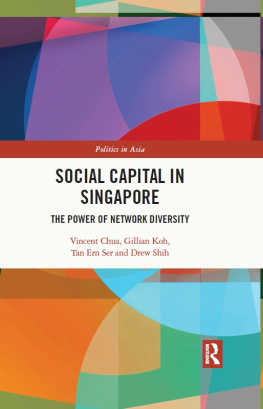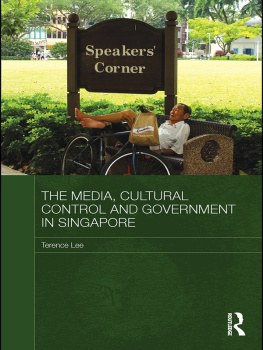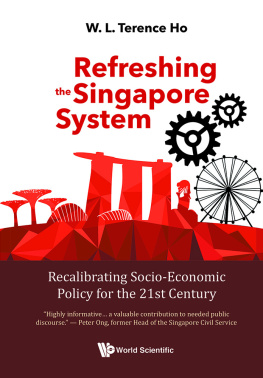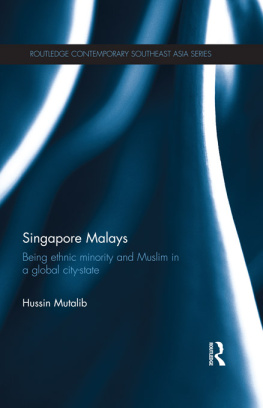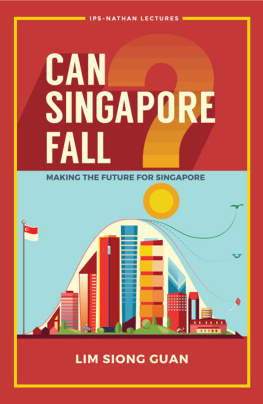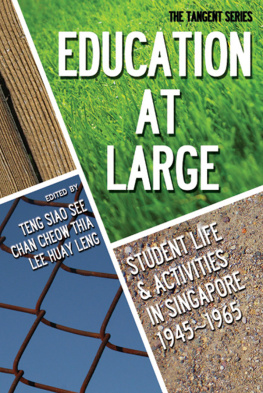RACE AND STATE IN INDEPENDENT SINGAPORE 1965-1990
Race and State in Independent Singapore 1965-1990
The cultural politics of pluralism in a multiethnic society
JOHN CLAMMER
First published 1998 by Ashgate Publishing
Reissued 2018 by Routledge
2 Park Square, Milton Park, Abingdon, Oxon, 0X14 4RN
711 Third Avenue, New York, NY 10017, USA
Routledge is an imprint of the Taylor & Francis Group, an informa business
Copyright John Clammer 1998
All rights reserved. No part of this book may be reprinted or reproduced or utilised in any form or by any electronic, mechanical, or other means, now known or hereafter invented, including photocopying and recording, or in any information storage or retrieval system, without permission in writing from the publishers.
Notice:
Product or corporate names may be trademarks or registered trademarks, and are used only for identification and explanation without intent to infringe.
Publishers Note
The publisher has gone to great lengths to ensure the quality of this reprint but points out that some imperfections in the original copies may be apparent.
Disclaimer
The publisher has made every effort to trace copyright holders and welcomes correspondence from those they have been unable to contact.
A Library of Congress record exists under LC control number: 98003169
ISBN 13: 978-1-138-33477-9 (hbk)
ISBN 13: 978-1-138-33479-3 (pbk)
ISBN 13: 978-0-429-44509-5 (ebk)
Contents
This book represents an attempt not at the kind of experimental ethnography of the kind that has so greatly exercised anthropologists (particularly those of a postmodern persuasion) in the last few years, but rather an attempt at a form of experimental history. It is in fact an attempt to write not a social history, but a sociological history, an altogether different thing. While social history has, while quite correctly breaking with a purely political and chronological interpretation of events, focused on the evolution of mores, civilizations and social customs and habits, a sociological history is one in my view which attempts to theorize events, mostly now in the past, according to the canons of cultural analysis. It is concerned not so much with the flow of events per se, as with the mechanisms of social change and continuity which they reflect and of which they are exemplars.
The case study in this instance is Singapore, my home for more than half of the period covered by this text and in the social and political events of which I was, unlike many even contemporary historians, a personal observer and in many cases a participant observer and even actor. My thesis is certainly that the first quarter century of Singapores existence as an independent state saw the creation of certain patterns of social organization, ideology and cultural formations which are still extant as Singapore enters its second quarter century and which will persist as deep structuresof society and polity well into the much awaited new century.
Certainly change is occurring, but, I argue, within this basic framework rather than through any fundamental revision or rethinking of that framework itself. Since 1990 gains for example have certainly been made in the economic and social standing of the Indian community. New forms of interethnic marriage have appeared, especially (with the increasing globalisation of Singapores economy and the resulting presence of large numbers of foreign professionals) between Singaporean women and Caucasian men. This itself has given a government, ever vigilant concerning the private lives of its citizens, occasion to coin the term (derived from Puccinis opera Madame Butterfly) of the Pinkerton effect - referring to foreign men who marry or have intimate relations with Singaporean women and then, as with Pinkerton in the opera, abandon them to return to their home countries. Concern with the informal sector and its extra-legal activities has to some extent shifted from illegal street hawkers (the subject of ).
The recent problems, beginning in 1997-8, which have beset all the Southeast Asian economies and the political events that have unfolded with them (the fall of Indonesias President Suharto being the most conspicuous) have highlighted once again after two decades of virtually uninterrupted growth, the problems of management not only of fragile economies, but also of the multiethnic societies which make up the region. Singapore has not been untouched by these events, nor by the globalised economic structures of which they are in large part a result. The question of the creation of the Singapore model and its underlying dynamics is of significance both for its own future development and for those other developing countries which have been tempted to look to it as an example to follow. The distinctive form of nationalist modernism that Singapore has pursued in its first twenty-five years of statehood must as a result offer itself as a subject of critical analysis for the understanding of its own internal social forms, its wider location in Southeast Asian and for the comparative analysis of non-Western modernities and development paths in general.
This book, as with all such texts, represents input from many sources, frequently friends and former colleagues who it is sometimes a little risky to publicly name in a book on Singapore. But as authors so often say in their acknowledgments, they will know who they are. I hope that they do, and their friendship, insights and local knowledge are gratefully and warmly acknowledged. Many of the chapters in this book began as conference and seminar papers and some of the ideas presented here have seen the light in other essays that I have drawn on in reorganizing my thoughts to constitute the present text. In particular I would like to acknowledge David Wu who first inspired what is now owes its origin to an invitation to speak at the Ethnicity and Identity seminar at the Institute of Social and Cultural Anthropology at Oxford, and I want to thank Jonathan Webber, Shirley Ardener and Robert Parkin for that opportunity. Other input and criticism has come from Mike Nellis, J.A. Sigler, Cedric H.C. Pan, Geoffrey Benjamin and former students in the Department of Sociology at the National University of Singapore. Many of the arguments presented here may be controversial and the responsibility for them is entirely mine, although all these people and many others have contributed to my thinking and the evolution of my ideas about the fundamental structures of the paradoxical society which is the subject of this book. The final writing of the book was undertaken while on sabbatical leave at St. Antonys College, Oxford, and I would like to thank the then Warden, Lord Dahrendorf, and the Fellows of the college, especially Roger Goodman, Robert Barnes and Ann Waswo for their hospitality and support during my stay there. Warm thanks are also due to Mrs Nora Harragin who typed the MS and assisted greatly in editing it for publication and responded patiently to every major and minor correction or amendment as the book was prepared for the printers.
As Singapore passes its thirtieth anniversary of independent statehood, and then contemplates the challenges that lie beyond this symbolic date, such as the rapid approach of the end of the Twentieth Century, assessing the lessons of its development and considering their comparative application become important tasks. This task is necessary both because of the intrinsic interest of the society - its rapid economic growth, public policies in areas such as housing, and the complexity of its social structure. Singapore is to a very great extent a planned society, and this point, often used by critics to attack the high degree of social order and even regimentation, is significant precisely because Singapore does represent one of the few society-wide attempts at total social planning. Outside of small-scale communitarian societies and possibly some of the former communist ones, few societies have attempted social planning and regulation on the scale that Singapore has done - planning that has extended from the management of the economy through the fields of education, language usage, housing, transportation, the media and medicine, even to intimate areas such as family planning and mate selection.

